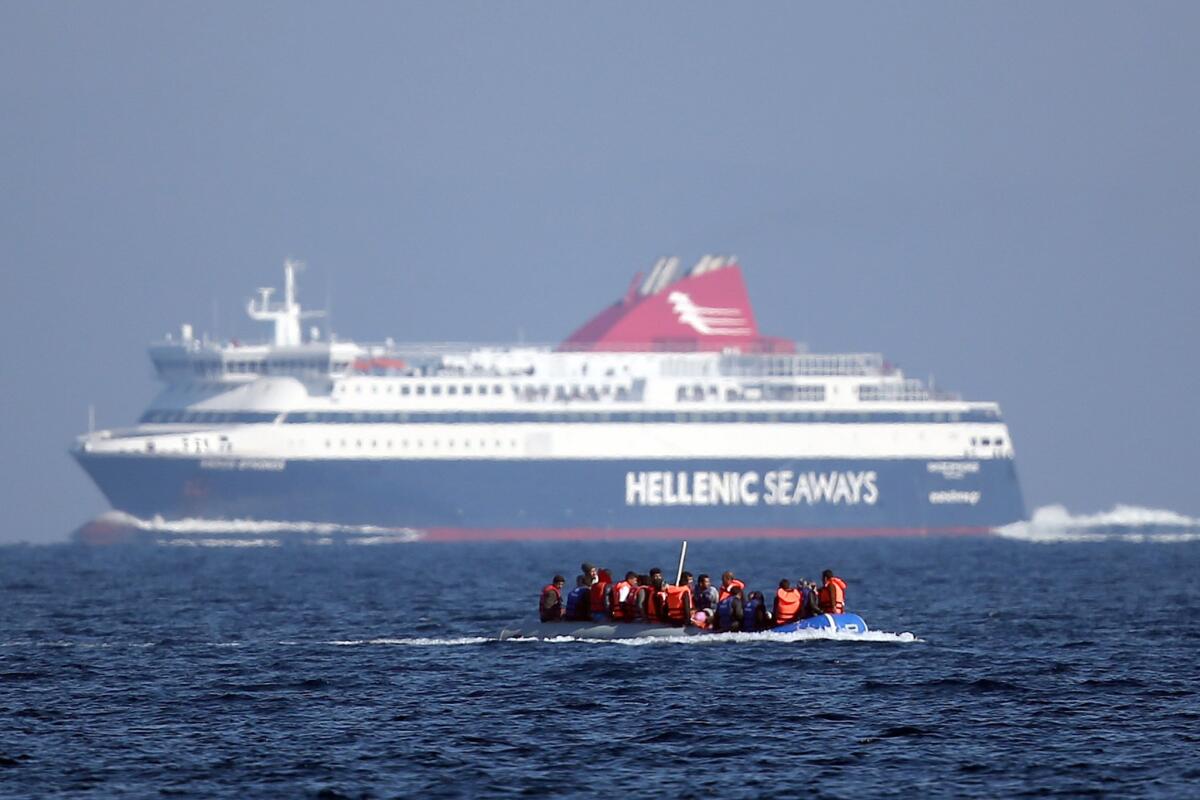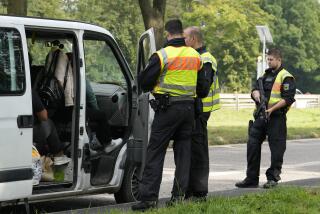The Paris terrorist attacks cast new suspicion on Syria’s migrants

Migrants seeking to escape Middle East violence for better lives in Europe, like these seen headed for the Greek island of Lesbos on Saturday, could face new barriers after the attacks in Paris.
- Share via
A Syrian passport found near the mangled body of a suicide bomber in the bloody aftermath of Friday’s terrorist attacks in Paris has fueled anti-migrant sentiment in Europe and confronted the sad tide of refugees fleeing war with new obstacles and suspicion.
Whether the passport reportedly recorded by migration officials on the Greek island of Leros more than a month earlier was that of a terrorist infiltrator or one of the thousands of counterfeits sold on black markets is unknown, — and probably likely irrelevant.
The document raised the possibility that Islamic State militants have made good on their threat to enter and attack Europe from within the wave of Syrian refugees. That was enough to spur calls Saturday for closing borders to the displaced, many of them having fled their homelands to escape the scourge of Islamic State extremists. Since summer, more than a million desperate people have flooded into the continent, dispersing from the Balkans to Scandinavia. from Scandinavia to the Balkans.
A boost for anti-immigrant forces?
As the death and injury tolls from the carnage claimed by Islamic State were still being tallied, France’s far-right National Front leader, Marine Le Pen, was calling for French citizens to “take back control” of their borders and “annihilate Islamist fundamentalism.”
In Germany, the leader of the anti-migrant Alternative for Germany lobby, which that has lambasted Chancellor Angela Merkel’s handling of the migration, crisis took to Twitter to boast that appeals coming from Merkel’s own political partners in the state of Bavaria to seal borders and require passports were tantamount to “advertisement” for the group’s policies.
Dutch far-right leader Geert Wilders urged the government to close the Netherlands’ borders immediately, saying the leadership of Prime Minister Mark Rutte had been “turning away and denying” the obvious perils to the Dutch citizenry from the poorly controlled flow of Middle East migrants.
United Europe’s leader under fire
Merkel has been the target of criticism and protest for months for welcoming an estimated 1 million migrants into Germany this year. But the Paris attacks that killed more than 125 people were being presented by right-wing groups as proof that her open-door policy exposes Germany to anger over Western airstrikes aimed at wiping out Islamic State.
“In light of the increased migration to Germany, we have to know who is driving through our country,” said Bavarian state Gov. Horst Seehofer, a political colleague critical of Merkel’s opening of German borders to the often-undocumented migrants.
“The Paris attacks have changed everything,” tweeted Markus Soeder, Bavarian state finance minister and, like Seehofer, a member of Merkel’s sister party, the Christian Social Union. “We cannot allow illegal and uncontrolled border crossing to continue.”
German Interior Minister Thomas de Maiziere warned against equating the latest terrorist attack in Europe with the peaceful migrants to for whom Europeans should be welcoming and supportive.
“I’d like to appeal urgently that no one rush to make a connection with the refugee situation,” De Maiziere told reporters in Berlin. “How we deal with the refugee crisis shouldn’t be linked in any way to how we deal with terrorism.”
A continent divided
Eastern European states that were locked behind the Iron Curtain for decades before the anti-communist revolutions of the late 1980s freed them have been among the most resistant in Europe to the tide of Muslims seeking to escape the region’s conflicts and poverty.
In Warsaw, where a conservative majority is set to take power Monday after last month’s parliamentary elections, the incoming minister for European affairs said Poland would scrap its agreement with other European Union states to take larger numbers of the migrants.
“In the face of the tragic acts in Paris, we do not see the political possibilities to implement” the migrant resettlement plan, Konrad Szymanski of the incoming Law and Justice Party told the right-leaning wPolityce.pl news site.
“We have been saying that there are enormous security risks linked to migration. Hopefully, some people will open their eyes now,” Slovakian Prime Minister Robert Fico told journalists in Bratislava after convening an emergency meeting of security officials.
In Hungary, Serbia, Macedonia, Croatia and Slovenia — all part of the Cold War-era communist empire in Moscow’s orbit — the burdens imposed on security and humanitarian relief agencies by the flow of hundreds of thousands of desperate refugees making their way north have created new social divisions and discord.
Even in the more welcoming countries of central and northern Europe, public backlashes are intensifying as citizens despair over the mounting social disruption. The more liberal a state’s attitude on receiving the refugees, it seems, the more the displaced make those generous states their destination.
North and South
As their southern flanks have proved the most accessible entrances to the European Union, Greece and Italy have seen the majority of migrants flow into the prosperous alliance through their Mediterranean Sea islands and ports.
Most of the refugees, though, have had their sights set on Germany, Austria, the Netherlands, Sweden and Norway, where governments provide more aid and support for the transition to new lives.
NEWSLETTER: Get the day’s top headlines from Times Editor Davan Maharaj >>
But the ad hoc system that has developed, in recent months, with the southern EU states allowing the refugees free passage to travel onward, may be under new threat as the governments controlling the points of entry reconsider their roles.
In Italy, Prime Minister Matteo Renzi met with security and intelligence officials to ponder tightening of the precautions against terrorist infiltration. But the Paris slaughter appeared to empower the right-wing Northern League in its demands for closing the door to Muslim refugees.
“All Islamic communities” in Italy should be subject to close surveillance, the nationalist party’s leader, Matteo Salvini, wrote on his Facebook page. “The throat cutters and Islamic terrorists should be ELIMINATED with force!”
Follow @cjwilliamslat for the latest international news.
ALSO:
‘Please, please! Stop!’ concertgoers pleaded as Paris theater came under siege
Paris terror attacks were plotted by a small extremist cell in Brussels, investigators suspect
A look at the neighborhood hit hardest by the Paris attacks
More to Read
Sign up for Essential California
The most important California stories and recommendations in your inbox every morning.
You may occasionally receive promotional content from the Los Angeles Times.











